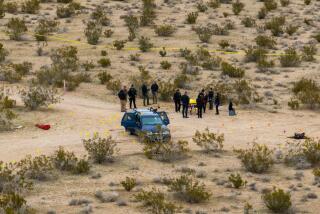Troops Blamed in Killing of Jesuits : El Salvador: President Cristiani addresses the nation. He says the November massacre of six priests will be further investigated by a military board of inquiry.
- Share via
MEXICO CITY — Salvadoran President Alfredo Cristiani announced Sunday night that members of the government armed forces committed the Nov. 16 slayings of six Jesuit priests, their housekeeper and her daughter at their Central American University residence in San Salvador.
In a nationally televised address, Cristiani said a military board of inquiry has been formed to further investigate the case, which has drawn international condemnation and threats from U.S. Congress members to cut off American aid.
“It has been determined that some elements of the armed forces were involved,” Cristiani said.
The president, however, did not say how many members of the military might be implicated or what rank they hold. He did not offer any specifics.
A source close to the investigation said that 45 members of the elite Atlacatl Battalion have been confined to their quarters and that some of them were called before the new military board to testify on Sunday.
He said the soldiers confined to quarters were “on (the university) campus and fired weapons” the night of the killings, but were not necessarily the men who murdered the priests.
“They are people who should know” who committed the murders, the source said. He said they “possibly” provided cover for the killers.
“The case is not solved yet,” the source said in a telephone interview. He spoke on the condition of anonymity.
Col. Rene Emilio Ponce, head of El Salvador’s Joint Chiefs of Staff, told the Associated Press that the men being interrogated were members of the unit that searched the Jesuits’ residence two days before the priests were slain.
Ponce insisted, however, that the members of the Atlacatl Battalion were not under arrest.
United Press International reported that a military source said five officers including a colonel had been detained in connection with the case. The report could not be independently confirmed.
The slain priests, considered among El Salvador’s leading leftist intellectuals, were taken from their beds at the university residence before dawn on Nov. 16 and shot with automatic weapons. Killed were: University rector Ignacio Ellacuria, vice rector Ignacio Martin-Baro, Segundo Montes, Amado Lopez, Juan Ramon Moreno and Joaquin Lopez y Lopez. Their housekeeper, Elba Julia Ramos, and her 15-year-old daughter, Celina, were also murdered.
The assassinations occurred in a heavily militarized zone of San Salvador during an overnight curfew that the government had imposed in response to a massive urban offensive by leftist guerrillas of the Farabundo Marti National Liberation Front. It was the largest rebel offensive in the 10-year civil war.
Church officials quickly blamed the murders on the military and produced a witness who said she observed armed men in uniforms like those on soldiers in the street enter the campus the night of the killings.
Lucia Barrera de Cerna, a housekeeper for the priests who lived next to the campus, was flown to the United States under U.S. protection after testifying in El Salvador. Then, after days of questioning in Miami, Barrera de Cerna retracted her story. She later told reporters that the U.S. investigators had accused her of lying and threatened her with deportation.
Administration officials have denied the charges.
On Sunday night, Cristiani asserted that the special military “honor commission” to investigate the killings was proof of his government’s commitment to protect human rights. He said the board will “determine the circumstances and clarify the truth in all its magnitude.”
The president called on Salvadorans to trust that “your government and your armed forces are committed to discovering every last person implicated in this detestable crime.”
Most of El Salvador’s civilian political killings, allegedly by military and paramilitary groups called “death squads,” have gone unsolved. The most highly charged of the killings is the 1980 slaying of the Archbishop of San Salvador, Msgr. Oscar Arnulfo Romero, who was gunned down while celebrating Mass.
More to Read
Sign up for Essential California
The most important California stories and recommendations in your inbox every morning.
You may occasionally receive promotional content from the Los Angeles Times.













